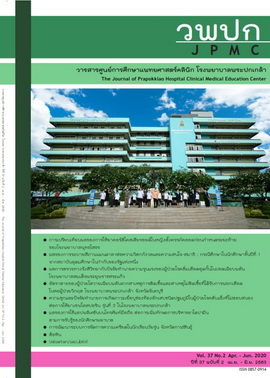The Effectiveness of Using Mobile Application Improving the Perception of Dopamine Drug Administration Skill among Nursing Students
Main Article Content
Abstract
Background: Dopamine is a drug that is classified as a high-alert drug and is often inaccurate administration. Therefore, the application of medication in helping with the calculation and administration of drugs is needed. Especially in nursing students and nurses at the ward will increase their skills of drug administration and reduce the risk that may occur to patients.
Objective: To study the effectiveness of using mobile application to improve the perception of dopamine drug administration skill among nursing students, Phrapokklao Nursing College
Materials and methods: This was a one group posttest-only design. The participants were 29 senior nursing students who were trained at the medical and cardiac intensive care unit, Phrapokklao Hospital from 3 December 2018 to 4 January 2019. The research tools composed of mobile application of dopamine drug administration, dopamine drug administration skill questionnaire and satisfaction of mobile application of dopamine drug administration questionnaire, the reliability was good with Cronbach's Alpha of 0.92 and 0.91 respectively. Percentage, arithmetic mean and standard deviation were used to analyze data with SPSS 24. The effect size was calculated using Cohen’s equation. Power analysis was calculated by G*power 3.1.9.2
Result: After using the mobile application of dopamine drug administration, there was a statistical significance increase in the dopamine drug administration skills among nursing students (p = 0.01, 95 % CI = 0.0680–0.3405) with medium effect size (ES = 0.57) at a power of 0.91. Participants reported that they had the highest level of satisfaction with overall and all items (mean = 4.7-4.8, standard deviation = 0.4-0.5) and also perceived the highest level of improvement in dopamine drug administrative skill for both overall and all items (mean = 4.7-4.8, standard deviation =0.4-0.5).
Conclusion: Mobile application can improve the perception of dopamine drug administration skills among nursing students. Therefore, this is an alternative way to improve the quality of dopamine drug administration skills for caring for the patients receiving dopamine in the clinical setting.
Article Details
References
Westbrook JI, Rob MI, Woods A, Parry D. Errors in the administration of intravenous medications in hospital and the role of correct procedures and nurse experience. BMJ QualSaf 2011;20:1027-34.
Ong WM, Subasyini S, Medication errors in intravenous drug preparation and administration. Med J Malaysia 2013;68:52-7.
Anderson P, Townsend T. Preventing high - alert medication errors in hospital patients. AmericanNurse Today 2015;10(5):18-22.
Islam R, Islam R, Mazumder TA. Mobile application and its global impact.IJET-IJENS 2010;10(6):72-8.
Ventola CL. Mobile devices and apps for health care professional: uses and benefit. P T 2014;39:356-64.
Yip YY. There's an app for that: the use of mobile medical applications in clinical prctice. Ontario Medical Review. 2014;81(8):48-50.
Mohapatra DP, Mohapatra MM, Chittoria RK, Friji MT, Kumar SD. The scope of mobile devices in health care and medical education.International Journal of Advanced Medical and Health Research. 2015;2(1):3-8.
Kim H, Suh EE. The effects of interactive nursing skills mobile application on nursing students' knowledge, self - efficacy, and skills performance: a randomized controlled trial. Asian Nur Res (Korean SocNursSci) 2018;12:17-25.
Koohestani HR, SoltaniArabshahf SK, Fata L, Ahmad F. The educational effects of mobile learning on students of medical sciences : a systematic review in experimental studies. J AdvMedEducProf 2018;6:58-69.
Alqahtani M, Mohammad H. Mobile applications' impact on student performance and satisfaction. TOJET 2015;14(4):102-12.
Hanrahan C, Aungst TD, Cole S. Evaluating mobile medical applications. Maryland: American Society of Health - System Pharmacist; 2014.
Dilorio CK. Measurement in health behavior : methods for research and evaluation. San Francisco: Jossey - Bass A Wiley Imprint; 2005.
Cohen J. A power primer. Psychol Bull 1992;112:155-9.
Faul F, Erdfelder E, Lang A-G, Buchner A. G*Power 3: a flexible statistical power analysis program for the social, behavioral, and biomedical sciences. Behav Res Methods 2007;39:175-91.
Masters K. Edgar Dale's pyramid of learning in medical education:a literature review. Med Teach [Internet].2013[cited 2019 June 30];35(11): e1584-e159.Available from: https://www.tandfonline.com/doi/pdf/10.3109/0142159X.2013.800636?needAccess=true

